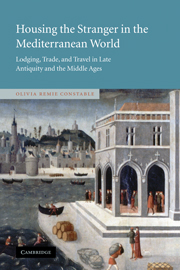 Housing the Stranger in the Mediterranean World
Housing the Stranger in the Mediterranean World Book contents
- Frontmatter
- Contents
- List of illustrations
- List of maps
- Acknowledgments
- Introduction: A culture of travel: words, institutions, and connections
- 1 “Accepting all comers”: a cross-cultural institution in late antiquity
- 2 The transition from Byzantium to the Dār al-Islām
- 3 Commerce, charity, community, and the funduq
- 4 Colonies before colonialism: western Christian trade and the evolution of the fondaco
- 5 Conquest and commercial space: the case of Iberia
- 6 Fondacos in Sicily, south Italy, and the Crusader states
- 7 Changing patterns of Muslim commercial space in the later middle ages
- 8 Christian commerce and the solidification of the fondaco system
- 9 The fondaco in Mediterranean Europe
- Conclusion A changing world: new peoples and institutions in the early modern Mediterranean
- Selected bibliography
- Index
1 - “Accepting all comers”: a cross-cultural institution in late antiquity
Published online by Cambridge University Press: 27 August 2009
- Frontmatter
- Contents
- List of illustrations
- List of maps
- Acknowledgments
- Introduction: A culture of travel: words, institutions, and connections
- 1 “Accepting all comers”: a cross-cultural institution in late antiquity
- 2 The transition from Byzantium to the Dār al-Islām
- 3 Commerce, charity, community, and the funduq
- 4 Colonies before colonialism: western Christian trade and the evolution of the fondaco
- 5 Conquest and commercial space: the case of Iberia
- 6 Fondacos in Sicily, south Italy, and the Crusader states
- 7 Changing patterns of Muslim commercial space in the later middle ages
- 8 Christian commerce and the solidification of the fondaco system
- 9 The fondaco in Mediterranean Europe
- Conclusion A changing world: new peoples and institutions in the early modern Mediterranean
- Selected bibliography
- Index
Summary
THE GOOD SAMARITAN
In the gospel of Luke, the parable of the Good Samaritan (10:30–35) tells the tale of a traveler who was robbed, beaten, and left half-dead by thieves on the road from Jerusalem to Jericho. This unfortunate wayfarer was rescued by a passing Samaritan, probably a merchant, who salved his wounds, mounted him on one of his animals, “brought him to an inn (pandocheion, πανδοχεῖον), and looked after him. Next day, he produced two silver pieces (denarii) and gave them to the innkeeper (pandocheus), and said ‘Look after him; and if you spend more, I will repay you on my way back.’”
The parable's use of the term pandocheion helps illuminate the landscape of lodging and travel in the eastern Roman Empire during the early centuries of the Common Era. This chapter surveys this multicultural terrain, looking at the shared and divergent understandings – both metaphorical and literal – of the pandocheion and other related hostelries in the pagan, Jewish, and Christian communities in the period from roughly the first to the seventh centuries. It first examines the meaning of the word pandocheion and related cognates in early sources, then situates this type of hostelry within the broader sphere of archeological and written evidence for the accommodation of travelers in late antiquity.
The Greek word pandocheion literally means “accepting all comers,” and these hostels were common along the highways and byways of the late antique world.
- Type
- Chapter
- Information
- Housing the Stranger in the Mediterranean WorldLodging, Trade, and Travel in Late Antiquity and the Middle Ages, pp. 11 - 39Publisher: Cambridge University PressPrint publication year: 2004


